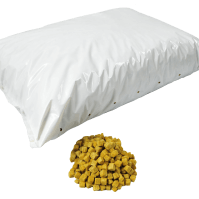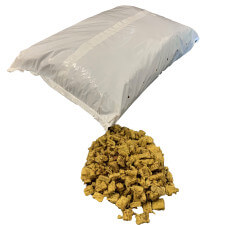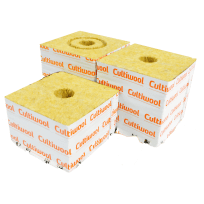
Optimizing Cannabis Cultivation: Why Stone Wool is the Best Growing Substrate
In the world of cannabis cultivation, the choice of growing substrate is as important as the right lighting and irrigation systems. Choosing the best substrate for your cannabis plants from so many options can be challenging.
Enter stone wool, particularly Cultiwool stone wool, a substrate that stands out for its unparalleled benefits in fostering cannabis growth. This article zooms in on stone wool's superiority as a growing substrate, underlining why it is the ideal choice for cannabis cultivators aiming for top-tier yield and health in their plants.
The Essence of Quality Growing Substrates
Substrates are the cornerstone of robust plant growth, offering a matrix for support, moisture, nutrients, and air – the four pillars for thriving cannabis plants. Selecting substrate materials is not merely about filling pots; it is about creating an ecosystem that nurtures the roots and, by extension, the entire plant. With cannabis, the stakes are even higher due to the plant's specific needs for moisture, nutrient uptake, and root space.
When considering the best growing substrates for cannabis, it is always good to compare stone wool (also known as rockwool) to other popular options. Each substrate comes with its own set of advantages and considerations, affecting water retention, aeration, nutrient management, and ease of use. Let us dive into how stone wool stacks up against some common alternatives:
Stone Wool vs. Coconut Coir
Coconut Coir: Made from the fibrous husks of coconuts, coco coir or coco peat is a natural product and is renowned for its strong water retention and natural resistance to bacterial growth. It is a renewable, pH-neutral medium that provides good aeration and is often used in hydroponic setups. Growers using coir must flush it properly before use, due to the high cation exchange capacity, to avoid the toxicity of some nutrients and deficiency (because of locked nutrients) of others.
Stone wool: Offers superior control over water and nutrient delivery compared to coco coir, due to its uniform structure. While coir retains water well, stone wool allows for more precise moisture and aeration management, crucial for optimal cannabis growth. Moreover, Stone wool is an inert, sterile, and therefore stable and reliable substrate. On the other hand, coir is much less reliable and has to go through extra care, such as flushing, to reach a state where it is safe to use in cannabis cultivation. Remember, in the medicinal market, even a small change in the products’ measurements, can be crucial.
Comparison: While both substrates support hydroponic cultivation, stone wool's predictability and control over the root environment often make it the preferred choice for growers seeking precision, in particular for the cannabis sector.
Stone Wool vs. Peat Moss
Peat Moss: A popular organic substrate, peat moss offers good moisture retention and natural acidity, which can benefit certain cannabis strains. It is often used in soil blends to improve water retention and aerate the root zone.
Stone wool: Unlike peat moss, stone wool does not break down over time, maintaining its structure throughout the plant's lifecycle. This stability is important for cannabis cultivation, ensuring consistent water and air availability to roots.
Comparison: Peat moss is best for growers looking for organic material and willing to manage its acidity. Stone wool's inert nature offers a blank slate for nutrient management, preferred by those prioritizing control and consistency.
Stone Wool vs. Perlite
Perlite: A volcanic glass that is expanded through a heating process, perlite is lightweight and provides good aeration and drainage when mixed with other substrates. It is often added to soil or coir to improve the physical properties of the medium.
Stone wool: Provides both aeration and moisture retention on its own, without the need for mixing with other materials. Its fibrous structure supports roots and holds water and nutrients efficiently.
Comparison: Perlite is an amendment rather than a standalone growing medium, used to enhance drainage and aeration. In contrast, stone wool is a comprehensive substrate solution, offering balanced water retention and aeration suitable for cannabis cultivation without the need for mixing.
Stone Wool vs. Clay Pebbles
Clay Pebbles: Lightweight, porous, and reusable, expanded clay pebbles are used in hydroponics systems for their good drainage and aeration. They are often used in flood and drain, deep water culture (DWC), and aquaponic systems.
Stone wool: While clay pebbles provide high drainage, stone wool's ability to retain water while still providing excellent aeration makes it more versatile for different hydroponic and even soil-based setups.
Comparison: Clay pebbles are suitable for systems requiring rapid drainage and minimal water retention. Stone wool, with its balanced properties, caters to a broader range of cultivation techniques, making it more adaptable for growers with diverse setups.
.png)
Why Stone Wool Reigns Supreme
Choosing the right growing substrate for cannabis cultivation depends on various factors, including the specific needs of the plant, the grower's experience, and the cultivation system in use. Stone wool's ascendancy in cannabis cultivation is not by accident. Crafted from molten volcanic rock spun into fibrous insulation, stone wool presents an airy, yet moisture-retentive structure ideal for cannabis roots. Its capacity for holding water while maintaining ample air spaces around roots makes it an exceptional choice, ensuring your cannabis plants have access to oxygen even as they soak up necessary moisture and nutrients. Stone wool stands out for its precision, control, and versatility, particularly appealing to those who prioritize consistent results and the ability to fine-tune the growing environment.

Technological Edge: Cultiwool's Innovations
Cultiwool stone wool takes the inherent advantages of stone wool a notch higher with its cutting-edge Donut Ring and Cross Groove technologies. These designs are more than mere features; they are game-changers in substrate engineering. The Donut Ring technology ensures a homogenous distribution of water and nutrients, vital for uniform root development and plant growth. Meanwhile, the Cross Groove pattern enhances drainage, preventing waterlogging and the dreaded root rot, ensuring your cannabis plants remain in perfect health.
Hydroponics and Stone Wool: A Match Made in Heaven
For hydroponic cannabis growers, the choice of substrate is crucial, balancing moisture retention with aeration. Stone wool, especially in a cube or block form, is ideally suited for hydroponics systems, providing a stable yet flexible medium that supports plant weight, facilitates root penetration, and maintains optimal moisture levels without the risk of overwatering.
Tailored for Hydroponic Success
Choosing stone wool for hydroponic cannabis cultivation offers a streamlined solution to the challenges of substrate selection. Its inherent properties eliminate the guesswork in moisture and nutrient management, making it a straightforward choice for ensuring your plants thrive.
Cutting-Edge Propagation and Seed Starting
The journey of a cannabis plant starts with successful propagation by cuttings or seed germination. Stone wool stands out as the substrate of choice for these critical early stages. Its sterile nature and moisture-holding capacity provide an ideal environment for starting seeds to germinate and rooting propagation cuttings, setting the foundation for healthy growth. Read our article about cannabis propagation from starting seeds and vegetative cuttings.
In Conclusion
Stone wool, particularly Cultiwool stone wool, is not just another substrate; it is a strategic choice for cannabis cultivators aiming for the pinnacle of plant health and yield. Its unique blend of water retention, aeration, and nutrient distribution, coupled with innovative technologies, makes it the undisputed leader in the substrate market. Embracing stone wool means setting your cannabis cultivation on a path to unmatched success.
For the Growing Blocks, we recommend using a nutrient solution with EC 2 mS/cm and a pH range of 5.5-5.8 during wet-up for optimal block preparation (read more in this article about pH and EC).
Cultiwool is produced from high-quality basalt rock, not slag wool. This ensures purity, durability, and consistent performance in every batch (Learn more in our article on the differences between slag wool and high-quality stone wool).
The donut ring design ensures uniform irrigation by guiding water evenly across the block, reducing dry spots and improving root distribution (you can read more about it in this article about Cultiwool’s product features).
Yes. As Cultiwool, we know and understand that every grower and facility has unique needs. We can provide custom-cut slabs, blocks, or plugs upon request. Contact us to explore possibilities.
Cultiwool Prime uses a natural, sugar-based binder. It is a more sustainable alternative to conventional chemical binders, supporting environmentally friendly cultivation.
Discover more about our Cultiwool network





